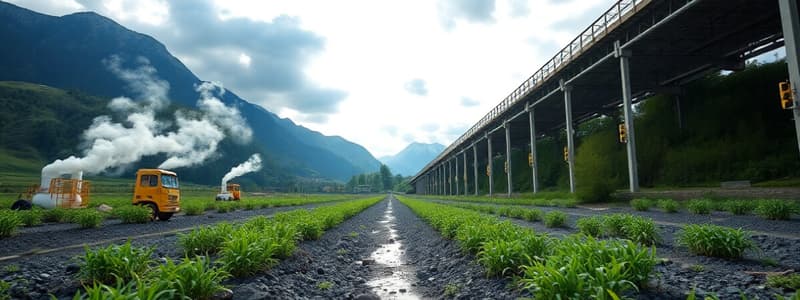Podcast
Questions and Answers
Which of the following is NOT a primary use of oil?
Which of the following is NOT a primary use of oil?
- Heating
- Vehicle fuel
- Producing plastics
- Electricity generation (correct)
Which of these gases is considered a key greenhouse gas?
Which of these gases is considered a key greenhouse gas?
- Carbon dioxide (correct)
- Oxygen
- Nitrogen
- Hydrogen
What is the primary cause of global warming as described in the text?
What is the primary cause of global warming as described in the text?
- Solar radiation changes
- Burning of fossil fuels (correct)
- Increased volcanic activity
- Deforestation
Which environmental impact is NOT mentioned as a consequence of global warming?
Which environmental impact is NOT mentioned as a consequence of global warming?
Which of the following is a common method for transporting oil?
Which of the following is a common method for transporting oil?
What is a detrimental impact of oil spills on coastal vegetation?
What is a detrimental impact of oil spills on coastal vegetation?
According to the case study, which of the following was a consequence of the 2013 oil spills in Trinidad and Tobago?
According to the case study, which of the following was a consequence of the 2013 oil spills in Trinidad and Tobago?
Which option best describes a key difference between the 1979 oil spill and 2013 oil spills in Trinidad and Tobago?
Which option best describes a key difference between the 1979 oil spill and 2013 oil spills in Trinidad and Tobago?
Flashcards
What are fossil fuels?
What are fossil fuels?
Fossil fuels are natural resources formed from the remains of ancient organisms over millions of years. They are primarily used for energy production and heating.
What are greenhouse gases?
What are greenhouse gases?
Greenhouse gases trap heat in Earth's atmosphere, contributing to the planet's natural temperature. However, excess greenhouse gases lead to global warming.
Define Global Warming
Define Global Warming
Global warming refers to the increase in Earth's average temperature, primarily caused by human activities such as burning fossil fuels and deforestation.
What is an Oil Spill?
What is an Oil Spill?
Signup and view all the flashcards
Climate Change Impact on the Eastern Caribbean
Climate Change Impact on the Eastern Caribbean
Signup and view all the flashcards
How is oil extracted?
How is oil extracted?
Signup and view all the flashcards
How is oil transported?
How is oil transported?
Signup and view all the flashcards
Compare Trinidad and Tobago Oil Spills
Compare Trinidad and Tobago Oil Spills
Signup and view all the flashcards
Study Notes
Natural Resources and Global Climate Change
- Global climate change is linked to natural resource use, specifically fossil fuels.
- Fossil fuels include coal, oil, and natural gas.
- Coal is primarily used for power generation and heating.
- Oil is used for vehicle fuel and heating.
- Natural gas is primarily used for electricity generation.
- Fossil fuels are found naturally in Earth's crust and formed over millions of years.
Understanding Greenhouse Gases
- Greenhouse gases trap heat in Earth's atmosphere.
- Key greenhouse gases include carbon dioxide (CO2), methane, and nitrous oxide.
- Some greenhouse gases are naturally occurring, while others are human-made.
- Small amounts of greenhouse gases are necessary to maintain Earth's temperature.
- Too much of these gases leads to global warming.
What is Global Warming?
- Global warming is the increase in Earth's average temperature.
- Causes include burning fossil fuels, deforestation, and industrial activities.
- This process creates an enhanced greenhouse effect, disrupting natural climate patterns.
- Global warming impacts both local and global environments.
Environmental Impacts of Global Warming
- Rising sea levels are a significant environmental impact of global warming.
- Melting glaciers contribute to rising sea levels.
- Increased drought conditions are also linked to global warming.
- More frequent extreme weather events, such as hurricanes and heat waves, are a result.
- Floods are a common consequence of these extremes.
- Global warming poses risks to wildlife habitats.
Focus on the Caribbean
- The Eastern Caribbean has low greenhouse gas emissions but is highly vulnerable to climate change.
- Regional impacts include rising sea levels threatening coastal areas, stronger hurricanes, and a potential threat to marine ecosystems and tourist industries.
Oil Extraction and Transportation
- Oil is collected through underground drilling and offshore platforms.
- Oil is transported by pipelines and oil tankers, each method poses risks.
- Safety measures are used to reduce the risks associated with oil extraction and transportation.
Understanding Oil Spills
- An oil spill is an accidental release of oil into the environment.
- Environmental impacts of oil spills include destruction of coastal vegetation, death of marine mammals, bird population effects, and water pollution.
Case Study: Trinidad and Tobago
- The 1979 oil spill had a limited environmental impact, but the 2013 spills led to extensive coastal damage and significant wildlife impact.
- These spills involved 11 separate incidents.
Taking Action
- Individual actions to address climate change include reducing energy consumption and using public transportation.
- Communities can support renewable energy, foster environmental awareness, and support clean energy policies.
- Global cooperation is crucial to effectively combatting global warming.
Studying That Suits You
Use AI to generate personalized quizzes and flashcards to suit your learning preferences.




